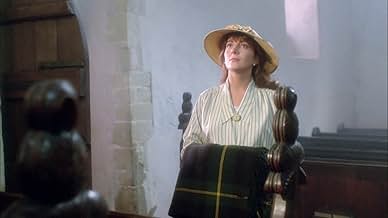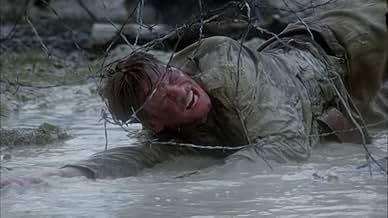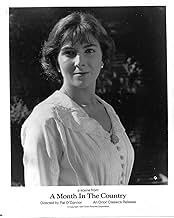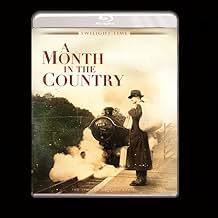NOTE IMDb
6,8/10
2,2 k
MA NOTE
Ajouter une intrigue dans votre langueTwo soldiers (Colin Firth, Kenneth Branagh) recover from World War I while spending a summer in a Yorkshire village.Two soldiers (Colin Firth, Kenneth Branagh) recover from World War I while spending a summer in a Yorkshire village.Two soldiers (Colin Firth, Kenneth Branagh) recover from World War I while spending a summer in a Yorkshire village.
- Réalisation
- Scénario
- Casting principal
- Récompenses
- 1 victoire et 1 nomination au total
Ken Kitson
- Mr. Sykes
- (as Kenneth Kitson)
Avis à la une
I saw this film probably 15 years ago, and have never forgotten it. It's about two World War I soldiers who are recuperating at a church. The one is trying to find the remains of the local priest - it's been a while so my brain's a bit rusty - and the other is revealing a mural on the church wall. There's also a love story/triangle to it. It is fabulously acted and demonstrates the horrors faced by men during war time. Kenneth Branagh's performance is worth the price of rental alone. Colin Firth manages to act for a change, rather than seem like he's sleepwalking. (Check out Apartment Zero, another older and decent film.) Exceptional!
13. A MONTH IN THE COUNTRY (drama, 1987) Birkin, a young WW1 veteran, arrives in the sleepy town of Oxgodby assigned to paint the church. He suffers from nightmares since being shell-shocked. Birkin meets the beautiful Alice (Natasha Richardson), the wife of the local pastor. Though they're immediately attracted to each other, they know they can't be together. But his love for Alice proves a happy respite from his war ravanged life.
Critique: To doze off in a sleepy afternoon watching 'A Month in the Country' feels almost like being there. This beautifully shot, nostalgic look at youth's lost moments, conjures up deeply felt emotions. The town of Oxgodby seems to exist between reality and fantasy. Slowly slumbering away in its own ambiance, unaware of the world around it. Where dreamers go, and weary travelers stumble on their way.
Pat O'Connor's doughty direction may get a bit tedious at times, but it has to be taken in the context of the film's setting (1920s England). Though some scenes do lag in pace, this does not take anything away from the film's dreamy (dark) undertones which are its strong points.
Character conflict is its weakest, however, since most of the characters react passively to the town's underhand prejudice. The best enduring quality is Birkin's lost-love relationship with both the town and Alice.
QUOTE: "God? What God? There is no God?"
Critique: To doze off in a sleepy afternoon watching 'A Month in the Country' feels almost like being there. This beautifully shot, nostalgic look at youth's lost moments, conjures up deeply felt emotions. The town of Oxgodby seems to exist between reality and fantasy. Slowly slumbering away in its own ambiance, unaware of the world around it. Where dreamers go, and weary travelers stumble on their way.
Pat O'Connor's doughty direction may get a bit tedious at times, but it has to be taken in the context of the film's setting (1920s England). Though some scenes do lag in pace, this does not take anything away from the film's dreamy (dark) undertones which are its strong points.
Character conflict is its weakest, however, since most of the characters react passively to the town's underhand prejudice. The best enduring quality is Birkin's lost-love relationship with both the town and Alice.
QUOTE: "God? What God? There is no God?"
It is a movie like a good book, you want to cozy down with on a long winters night....it said more than it showed and it showed more than it said..the parting of Birkin and Moon mostly, Birkin, had me watching it several times,,what were the questions and the answers?...it reminded me of "Waiting for the Moon" with Linda Hunt...thanks
This pastoral English period piece must be one of the quietest anti-war movies ever made, with a single gunshot heard throughout the entire film (except for the brief battleground flashback before the opening credits), and fired only by a sportsman. But its effect is no less traumatic on the shell-shocked protagonist: a veteran of The Great War taking refuge, after the Armistice, in an isolated English village, far away (except in his nightmares) from the trenches. Hired by the local church to excavate a medieval mural above the alter, he uncovers, in no particular order: an age-old mystery; a bittersweet attraction to the vicar's young wife; a kinship with another ex-soldier (Kenneth Branagh, pre-'Henry V') and, finally, some of the dignity he lost in battle. Don't expect any grand gestures from the leisurely told story. Any positive response to the film will depend entirely on a tolerance for such anachronistic virtues as forbearance, charity, and forgiveness.
When an arm or leg is removed, the amputee can continue to 'feel' it for some time afterwards. The phantom limb can hurt, or itch, or feel cold. But nothing is truly the same.
Similarly, the First World War irrevocably altered Britain, but in its immediate aftermath we limped on, unaware (or unwilling to admit) that anything had changed. It's this brief period of denial that Month in the Country illustrates: the moment when we teetered on the edge of the 19th century before toppling into the 20th.
Consequently, while it is a film of great heartbreak and loss, it is also one of great hope and triumph of the human spirit. There is one scene that perfectly illustrates this: a little girl visits her friend, who is sick in bed. She talks about the weather and her new hat and how they'll play together when her friend gets well. Then as she walks back home she says to Colin Firth
'She knows she's dying, doesn't she?'
It is as tragic for the girl to be so knowing and capable in the face of death as it is for young men to have experienced the hell of the trenches and return to indifference and hostility. But because of that tragedy they will go on to experience a more real, and potentially more joyful world, than the other inhabitants of comfortable and conventional Oxgodby.
Similarly, the First World War irrevocably altered Britain, but in its immediate aftermath we limped on, unaware (or unwilling to admit) that anything had changed. It's this brief period of denial that Month in the Country illustrates: the moment when we teetered on the edge of the 19th century before toppling into the 20th.
Consequently, while it is a film of great heartbreak and loss, it is also one of great hope and triumph of the human spirit. There is one scene that perfectly illustrates this: a little girl visits her friend, who is sick in bed. She talks about the weather and her new hat and how they'll play together when her friend gets well. Then as she walks back home she says to Colin Firth
'She knows she's dying, doesn't she?'
It is as tragic for the girl to be so knowing and capable in the face of death as it is for young men to have experienced the hell of the trenches and return to indifference and hostility. But because of that tragedy they will go on to experience a more real, and potentially more joyful world, than the other inhabitants of comfortable and conventional Oxgodby.
Le saviez-vous
- AnecdotesFilm historian Nick Redman mentions in his commentary included in the BFI edition of the movie that, at the time of its original release, this was said to be a movie "starring two nobodies".
- GaffesAccording to Alice Keach, her roses are the variety Sarah Van Fleet. However, the film is set in 1920 and Sarah Van Fleet roses were not introduced until 1926.
- Citations
Reverend Keach: Mr. Birkin, you should know here and now that you employment here does not have my support. But as the solicitors refuse to pay out the £1,000 bequest to our fabric fund until your job is finished I have no choice.
Meilleurs choix
Connectez-vous pour évaluer et suivre la liste de favoris afin de recevoir des recommandations personnalisées
- How long is A Month in the Country?Alimenté par Alexa
Détails
Box-office
- Montant brut aux États-Unis et au Canada
- 443 524 $US
Contribuer à cette page
Suggérer une modification ou ajouter du contenu manquant




















